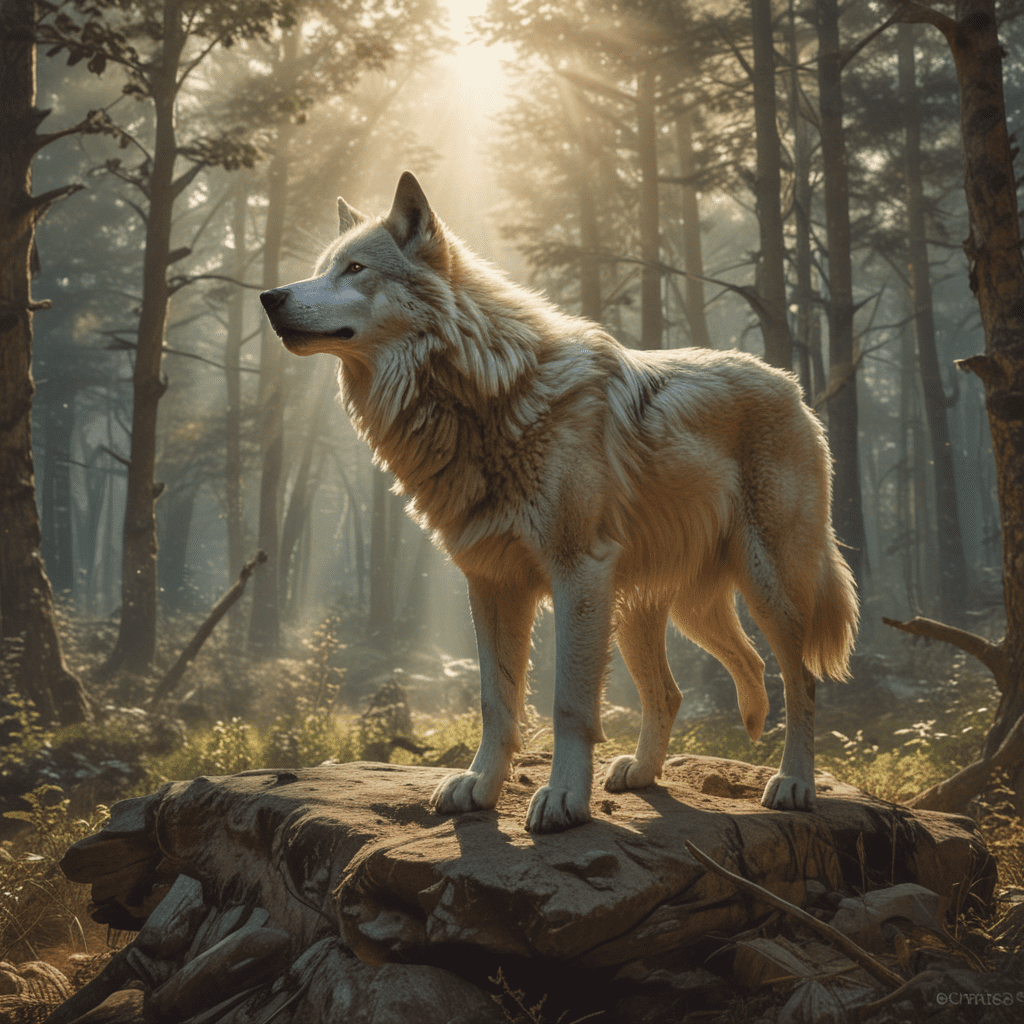The Legend of the Wind Wolf in Native American Mythology
Introduction:
The Legend of the Wind Wolf holds a profound place within Native American mythology, narrating the tale of a mystical creature embodying the untamed spirit of the wilderness. Through generations, this legend has served as a sacred narrative, shaping the cultural identity and spiritual beliefs of numerous tribes.
Origins of the Wind Wolf:
Various Native American tribes possess unique creation stories surrounding the genesis of the Wind Wolf. In some accounts, it is believed to have emerged from the Great Spirit’s breath, embodying the essence of freedom and the untamed forces of nature. Other tales depict the Wind Wolf as the offspring of the sky and the earth, inheriting the wisdom and power of both realms.
Symbolism and Meaning:
The Wind Wolf serves as a multi-faceted symbol, representing the boundless spirit of freedom, unwavering loyalty, and profound spirituality. Its association with the four cardinal directions and the elements reflects its connection to the natural world and its role as a guardian of the land. Within Native American traditions, the Wind Wolf is revered as a messenger between the physical and spiritual realms, guiding individuals on their life’s journey.
The Role of the Wind Wolf in Tribe:
Throughout Native American tribes, the Wind Wolf holds a significant position as a guiding spirit, protector, and messenger. It is believed to assist in times of need, offering guidance and strength to those who seek its favor. The Wind Wolf’s presence is invoked during ceremonies, dances, and rituals, where it is revered as an intermediary between humans and the spirit world.
Variations of the Legend:
While the core elements of the Wind Wolf legend remain consistent, variations exist across different Native American tribes. In certain stories, the Wind Wolf is depicted as a solitary creature, embodying the untamed spirit of the wilderness. Other accounts portray it as a companion to legendary heroes, aiding them in their quests and adventures. Regional variations in the legend reflect the diverse cultural landscapes and beliefs of Native American tribes.

Legends from Specific Tribes:
The Lakota Tradition:
Within the Lakota tribe, the Wind Wolf is known as “Wakan Tanka” or “Great Spirit Dog.” It is believed to embody the wisdom and power of the Great Spirit, guiding and protecting the Lakota people. Legends tell of a time when the Wind Wolf appeared to a Lakota warrior, bestowing upon him the gift of swiftness and courage.
The Cheyenne Tradition:
In Cheyenne mythology, the Wind Wolf is known as “Maheo.” It is revered as a symbol of loyalty and unwavering companionship. Legends depict Maheo accompanying Cheyenne warriors on their hunts and battles, providing them with strength and protection. The Wind Wolf is also considered a messenger, carrying prayers and offerings to the Great Spirit.
The Navajo Tradition:
Navajo legends recount the Wind Wolf as “Naayéé’,” a creature of immense power and wisdom. It is believed to dwell in the mountains and canyons, guarding the sacred places of the Navajo people. Naayéé’ is often invoked in Navajo ceremonies and rituals, where it is revered as a symbol of healing and protection.
The Wind Wolf in Contemporary Native American Art:
Preserving Cultural Heritage:
The Wind Wolf continues to be a significant symbol in contemporary Native American art. Artists incorporate the image of the Wind Wolf into paintings, sculptures, and jewelry, preserving the cultural heritage and storytelling traditions of their ancestors. Through these works of art, the legend of the Wind Wolf is kept alive, inspiring and connecting Native American communities.
The Wind Wolf as an Environmental Symbol:
Protecting Wolves and Habitats:
In recent years, the Wind Wolf has emerged as a powerful symbol in the fight to protect wolves and their habitats. Native American tribes and environmental organizations advocate for the preservation of wolf populations, recognizing their vital role in maintaining the balance of ecosystems. The Wind Wolf legend serves as a reminder of the deep connection between humans and nature, inspiring efforts to safeguard the wilderness and its inhabitants.
FAQs
What is the significance of the Wind Wolf in Native American mythology?
The Wind Wolf symbolizes freedom, loyalty, spirituality, and the connection between humans and nature.
Which tribes have legends about the Wind Wolf?
The Lakota, Cheyenne, and Navajo tribes have prominent legends featuring the Wind Wolf.
How is the Wind Wolf depicted in Native American art?
The Wind Wolf is often depicted in paintings, sculptures, and jewelry, preserving cultural heritage and inspiring connections within Native American communities.
What is the role of the Wind Wolf in the environmental movement?
The Wind Wolf serves as a symbol in the fight to protect wolves and their habitats, emphasizing the importance of preserving the balance of ecosystems.


